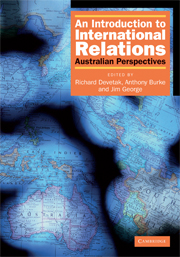Book contents
- Frontmatter
- Contents
- List of tables, figures and boxes
- List of contributors
- Preface and acknowledgments
- An introduction to international relations: the origins and changing agendas of a discipline
- 1 Theory and practice in Australian international relations: the search for identity and security
- Part 1 Theories of international relations
- Part 2 The traditional agenda: states, war and law
- 10 The modern state and its origins
- 11 Nationalism and war
- 12 Security
- 13 Arms control
- 14 The changing character of warfare
- 15 The ethics and laws of war
- 16 International law
- 17 International society and european expansion
- 18 Order and decolonisation in Southeast Asia
- 19 The cold war
- Part 3 The new agenda: globalisation and global governance
- Glossary of terms
- Bibliography
- Index
- References
15 - The ethics and laws of war
from Part 2 - The traditional agenda: states, war and law
- Frontmatter
- Contents
- List of tables, figures and boxes
- List of contributors
- Preface and acknowledgments
- An introduction to international relations: the origins and changing agendas of a discipline
- 1 Theory and practice in Australian international relations: the search for identity and security
- Part 1 Theories of international relations
- Part 2 The traditional agenda: states, war and law
- 10 The modern state and its origins
- 11 Nationalism and war
- 12 Security
- 13 Arms control
- 14 The changing character of warfare
- 15 The ethics and laws of war
- 16 International law
- 17 International society and european expansion
- 18 Order and decolonisation in Southeast Asia
- 19 The cold war
- Part 3 The new agenda: globalisation and global governance
- Glossary of terms
- Bibliography
- Index
- References
Summary
Introduction
This chapter provides a brief introduction to the ethics and laws of war in three parts. The first part outlines what international law and the ‘just war’ tradition have to say about recourse to force, the second section explores the conduct of war and the final section explores two contemporary issues as examples of moral and legal debate: the legitimacy of preemptive self-defence and the use of cluster bombs.
In early 2003, millions of people took to the streets of Australia's capital cities to protest the government's decision to join the US in the invasion of Iraq. Protesters argued that the war was immoral (because innocent civilians would die), illegal (because it was neither an act of self-defence nor explicitly authorised by the UN Security Council) and unnecessary (because they did not believe that conclusive evidence of Saddam's weapons of mass destruction (WMD) program had been presented). In its defence, the Howard government mixed legal justifications with moral and strategic claims. Borrowing advice from the British, it argued that the war was legal because it had been tacitly authorised by UN Security Council resolutions dealing with Iraq's invasion of Kuwait in 1990; morally just, because it aimed to overthrow a tyrannical regime that had butchered hundreds of thousands of its own citizens, and strategically important because Saddam's WMD program threatened regional security and raised the possibility of a nightmare scenario long predicted by terrorism experts – a rogue regime passing WMD capabilities to terrorist groups.
- Type
- Chapter
- Information
- An Introduction to International RelationsAustralian Perspectives, pp. 179 - 189Publisher: Cambridge University PressPrint publication year: 2007

